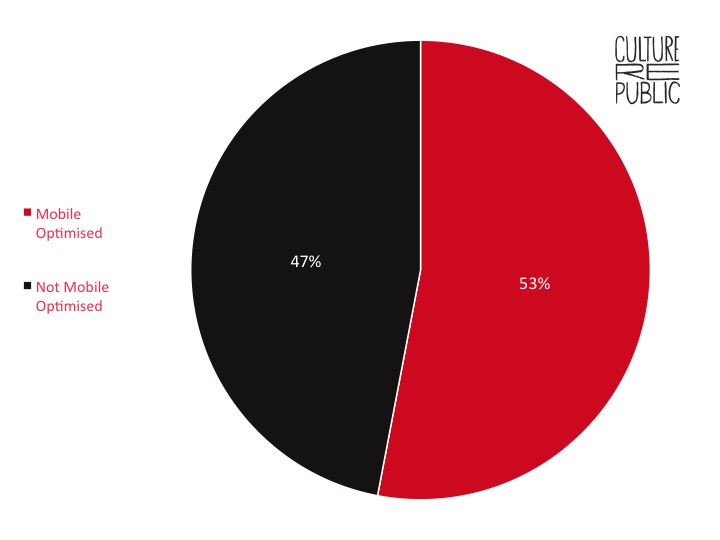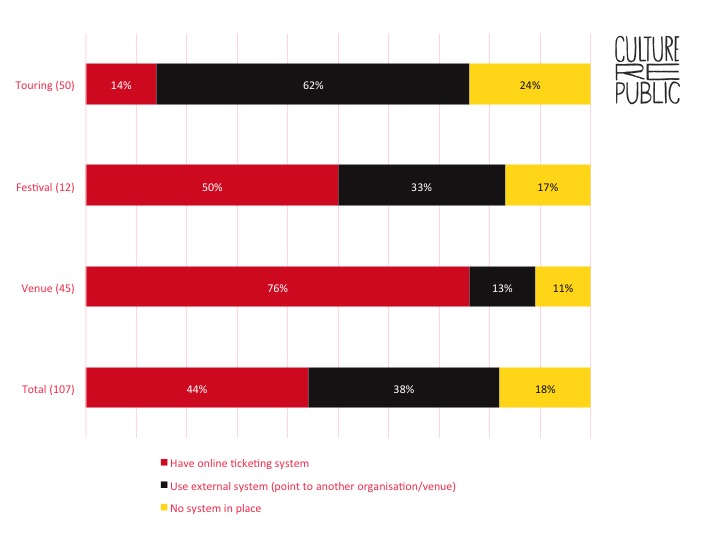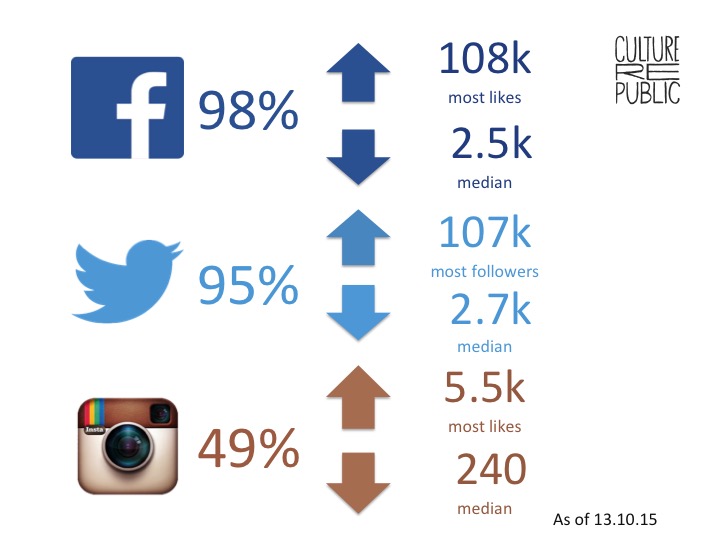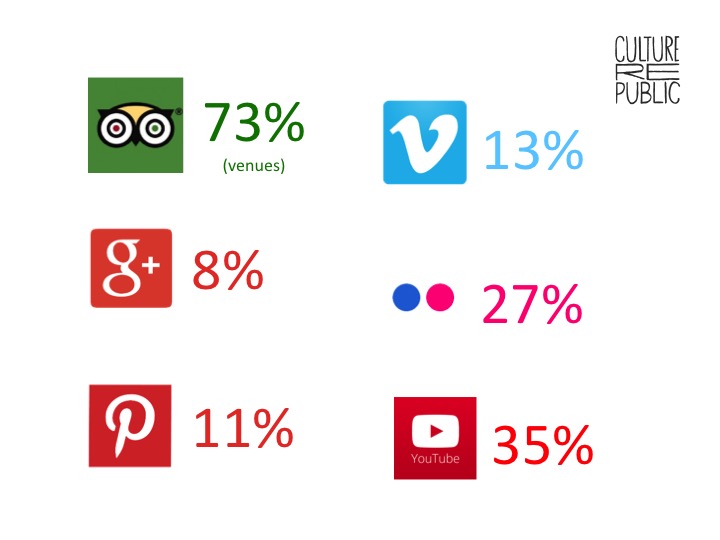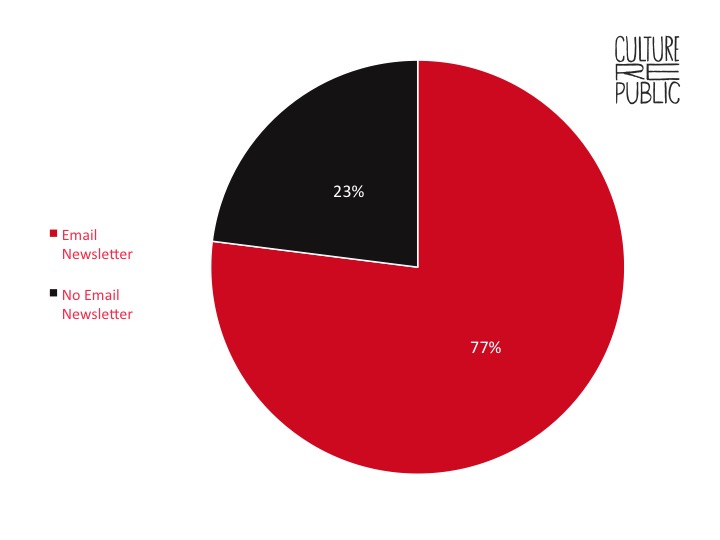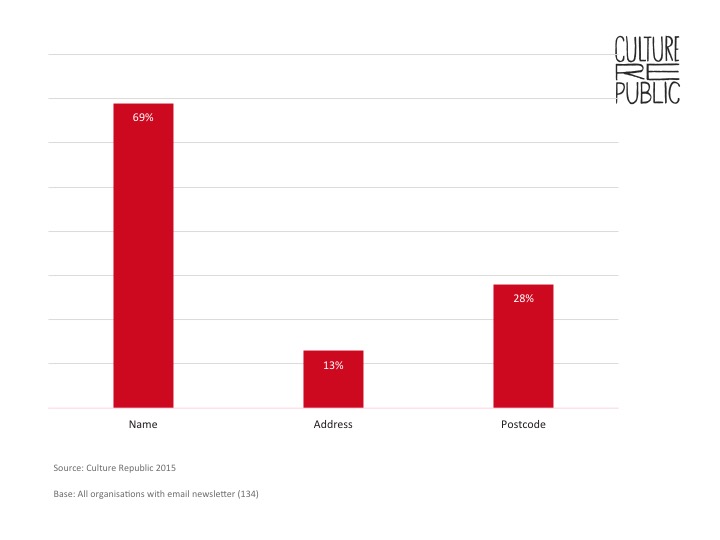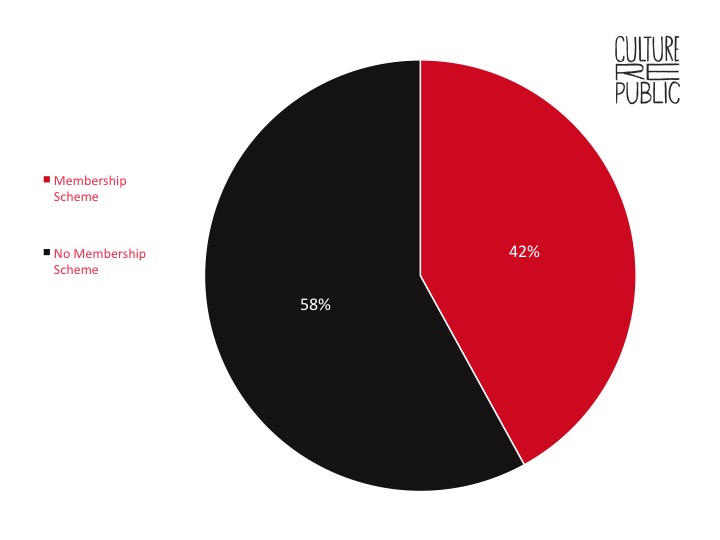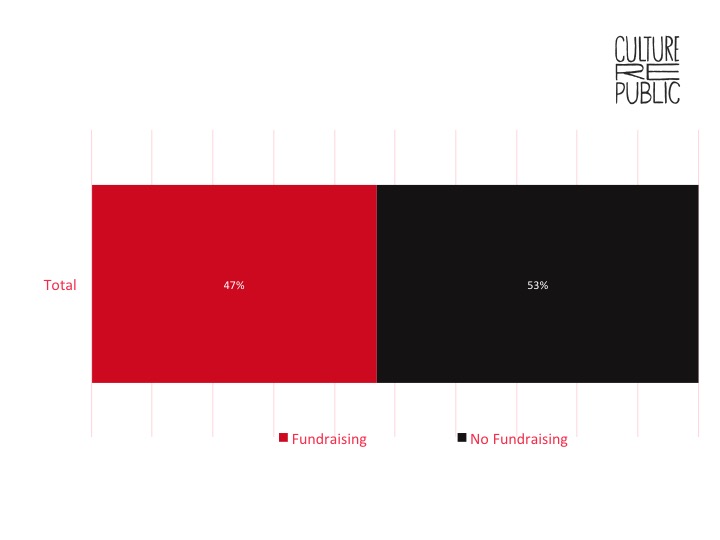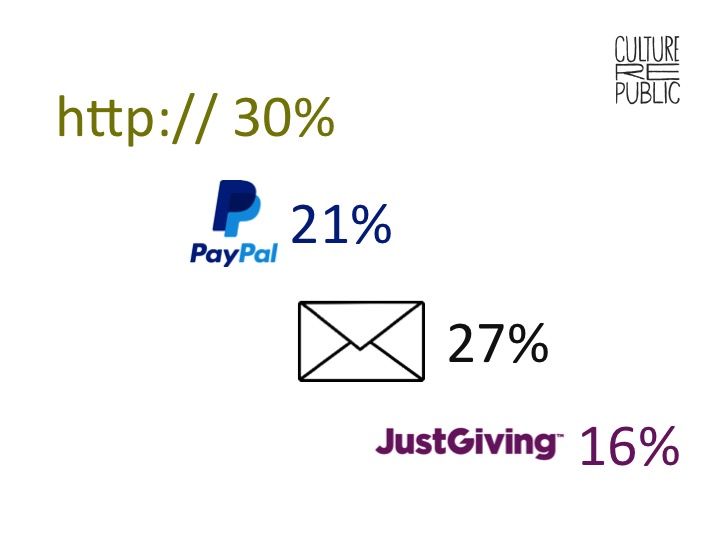The post Archived: June First Wednesday appeared first on Culture Republic.
]]>Do you want to know more about how you can connect data from your CRM, ticketing and email systems to improve your organisation’s marketing and communications?
In this First Wednesday session, Cameron Leask will join us from digital specialists Escrivo to focus on how arts organisations can work with multiple sources of audience and customer data, and discuss ways you can integrate them to build a more coherent, overall approach to your marketing and communications.
Starting with a simple model for thinking about your digital audience touch points, Cameron will cover how data can be moved and related between systems. This will be an interactive session so please bring a knowledge of your existing systems for collecting and managing data, and be prepared to ask lots of questions!
At this session we will look at:
- The terminology and roles of servers, “cloud”, data storage, mobile, and how they all relate
- A model for thinking about your organisation’s digital audience touch points, as you consider how to integrate them
- What actually happens to data, and where it goes, when it gets collected
- Ideas for how you can relate and integrate data from your own systems to improve your marketing and communications
Why you should attend?
This First Wednesday is ideal for anyone using these systems – Marketing & Communications Managers, Digital Marketers, Fundraisers, Operations and Box Office Managers – who want to understand their audience and customer data better, how they integrate and as a result improve their organisations’ marketing and communications.
AGENDA
12.15 – Arrival, brown bag lunch
12.30 – Welcome & introduction
12.35 – Partners introduction round the room
12.45 – Cameron Leask, Escrivo
13.45 – Q&A
14.00 – End
Meet our speaker – Cameron Leask from Escrivo
With over 20 years of professional experience as a Digital Business advisor, Cameron’s skillset spans the worlds of business and technology. He has worked on an extensive range of ecommerce platforms, digital projects and business systems, from web-based applications for a global audience to simple microsites, webpages and PayPal buttons. He has worked with clients in multiple sectors, and with organisations of every size from owner-managed businesses to global enterprises, including BBC, BskyB, GE Capital, Ted Baker, Transport for London and many others.
In 2002 Cameron founded digital agency Escrivo Internet Consulting, where he leads a niche team of ecommerce developers. Equally at home talking about low-level technology or high-level strategy, Cameron brings his experience and a pragmatic approach to every engagement, helping clients embrace and implement ecommerce solutions for business growth and development.
ABOUT FIRST WEDNESDAYS
Some of the most stimulating sessions take place when there’s the opportunity to step away from the pressure of a busy job, get together with colleagues and share learning.
That’s why we are hosting ‘First Wednesdays’ – a series of topical, bite-sized information sessions taking place on the first Wednesday of each month.
They are an open invitation each month for our Partners and industry colleagues to regularly drop in our offices to keep up to date with ideas and examples of useful practice we’ve gathered from across the country.
It might be as simple as hearing how other people have successfully tackled the same challenges you face building profitable customer relationships and wider public engagement or learning about the raft of new tools or approaches emerging daily.
Our goal is to inspire fresh thinking, expand current networks and focus on the Most Important Thing … to build new audiences and greater engagement.
If you can’t join us in person, why not sign up for a periscope registration. You will be able to tune in remotely so you can still hear from our speakers from wherever you are!
Join the conversation #1stWed
FAQs
What can I bring to the event?
Please bring your own electrical devices to take notes.
Where can I contact the organiser with any questions?
If you have any questions prior to the event please contact us on [email protected]
What is the refund policy?
We have a 48hr cancellation policy. If you are unable to attend the event please let us know 48hrs in advance of the event. After this time you will not be eligible for a refund.
The post Archived: June First Wednesday appeared first on Culture Republic.
]]>The post How to get started with Marketing Automation: April’s First Wednesday appeared first on Culture Republic.
]]>It might sound like it’s all about computers and machinery but ultimately MA is about building better relationships with people. The software can improve your data collection, giving you greater insight into who your customers are and how they interact with you. It also makes it easier for you to put this audience data to good use, as it makes it possible to tailor the user experience automatically. This personalisation is vital to nurturing prospects and converting them into regular customers.
The technology also helps you to analyse whether what you’re doing works and identify room for improvement. Crucially, it allows marketers to illustrate their value. By bringing all your marketing tactics together in one place MA enables you to quantify activity, measure impact and calculate ROI more efficiently and accurately.
Marketing automation, however, is not a ‘press and go’ software. It takes time to understand, to prepare for and to find the right platform. In this blog we share Stuart and Sarah’s advice on taking your first steps into marketing automation:
Plan
Time spent planning is crucial as MA will magnify, not solve, any inefficient processes you might have. To make it work you’ll need a comprehensive strategy that integrates the right processes, people, content and data. So, before launching a MA campaign you should answer some key questions:
- What are your goals?
- What strategy will help you reach these goals?
- Who should lead on the project?
- How will you measure success?
Research
There are a range of MA platforms available to you. Marketo, Pardot and Hubspot are often referred to as the leaders in marketing automation software. These are big platforms with powerful functionality and they come with a big price tag to match. Mailchimp, Instapage and Leadius are three cheaper options. They lack some of the capabilities of the bigger platforms but can be a nice introduction to the world of MA. Before making your decision use free trials to find out the pros and cons of each platform and determine suitability for your needs.
Start small
Don’t be overzealous in your ambitions. Whilst MA offers a lot of tempting features it is also a large investment in terms of money and time. Rather than paying out for software you don’t need, begin by experimenting with one or two MA features. For example, you could test out the automatic email function in Mail Chimp, see what results you get from that and go from there.
And remember, if you need help identifying your audiences or planning a marketing approach we’re here to help. Give us a call or send us an email – we’d love to hear from you.
The First Wednesday discussion continues next month when we’ll explore augmented reality with Trevor Jones and David Oaxly of CreativTek. First Wednesdays are exclusively available to Culture Republic Partners. Get in touch if you’d like to find out more about these events or our partnership offer.
The post How to get started with Marketing Automation: April’s First Wednesday appeared first on Culture Republic.
]]>The post Archived: Box Office Best Workshop appeared first on Culture Republic.
]]>Culture Republic is bringing you a box office data management workshop aimed at arts and cultural organisations. This hands-on session will be led by Charlotte Wilson, Associate Director at Culture Republic.
What’s it all about?
Your Box office data is precious: so, what can you do to manage it and keep it safe? This practical workshop tells you all you need to know about collecting, using, cleansing, protecting, sharing and extracting data to make sure you are making the most of your Box Office.
The workshop will take you through key areas of data management. Where does your data come from? How should your database be structured? You’ll learn how to clean your data, how to optimise it for analysis, how best to extract and share data and what you need to know about Data Protection. You will learn about performance and discount coding, booker segmentation and get top tips for data migration. You’ll discover just how much of your venue’s success depends on having a great database, and how the quality of your database depends on the quality of your coding. An unmissable workshop for anyone working in a Box Office today.
Who should Attend?
- Box Office staff
- Marketers who want to understand more about Box Office data
By the end of this workshop participants will:
- Feel more confident about using their database, including extracting data
- Feel more confident about sharing their database
- Feel more confident about data protection legislation
- Understand the issues around data capture
- Understand the issues to consider when migrating their data to a new system (what data do I want to keep? What problems might I encounter?)
- Understand their box office database, including types and levels of data.
- Feel more confident about managing their database, including cleaning.
- Optimise their database as an analytical tool through improved data practices, standardisation and coding
Lunch will be provided.
Feedback from Attendees
“Charlotte’s approach is fantastic. Relaxed but very informative. She gives confidence for any and all questions asked. This caters to the fact that the backgrounds and levels of experience of the attendees can be vastly different.”
“A relaxed learning environment and atmosphere. The supplied workbook was very well organised and a very good reference to keep.”
Agenda
10.30:
Registration & coffee
10.45:
Introductions
11.00:
Where does my data come from?
How is the database structured?
What should I do to clean my data?
What should I do to manage my data?
12.00:
Break
12.15:
How can I optimise my data for analysis?
Can we police data capture?
Data Protection
13.15:
Lunch
13.45:
FAQs
Can we share our data?
Extracting data
Summary & Useful terminology
Sources & further reading
15.00 FINISH
Speaker – Charlotte Wilson, Associate Director, Culture Republic
With a degree in marketing and finance, a wealth of quantitative and qualitative research experience and a member of the Market Research Society, Charlotte Wilson has been a leading figure in the research teams of Culture Republic, Culture Sparks and Glasgow Grows Audiences since 2004.
She has particular expertise in working with and analysing box office data, and was project manager for The Source, the first national benchmarking project for the performing arts in Scotland.
Culture Republic’s Touring Workshop Cycle
This is the the first of Culture Republic’s four part touring workshop cycle.
Box Office Best, Asking the Right Questions, Practical Digital Communications and What’s Your Story are practical, full-day training sessions for you and your team. These four training sessions will be delivered at venues across Scotland in 2016/17, and are free for Culture Republic partners.
The post Archived: Box Office Best Workshop appeared first on Culture Republic.
]]>The post Horizon 2016 – five digital marketing trends to watch appeared first on Culture Republic.
]]>#1 Automation
As anyone using email marketing or remarketing tools will have noticed, automation tools are getting cleverer and more precise every day, and smart marketers will be exploiting this to the full in 2016.
- Be targeted – but don’t be creepy! You are likely already using marketing automation but, as always, with great power comes great responsibility. Econsultancy’s summary is a good reminder of places you can use it and how to make sure that you’re giving customers the information and messages that they can really use. Their best advice is to take care not to be creepy about it despite the temptations, flagged here by Social Media Week, of new opportunities for personalisation and targeting.
- Will a robot take your job? Robotics doesn’t stop at driverless cars: according to Econsultancy, robots can now write marketing copy, although they still need humans to add nuance. And it doesn’t stop there: the Stage recently profiled a new West End musical whose plot and musical themes were created by an algorithm that distilled a “recipe for success”. And lest you think that live performance is safe, the Guardian reported on the first robot opera performer. Worried now? Check out Nesta’s handy quiz to find out whether a robot will take YOUR job!
#2 Influencer marketing
Content marketing isn’t going away … but 2016 is set to be the year of influencer marketing. This is all about getting maximum impact from the content you produce, by exploiting your networks to the full. How to do it? You need to make sure your best content reaches the tastemakers in your social networks, to transform them into your advocates.
- Get started The big idea is to find those bloggers and online personalities that are trusted on a particular topic as their endorsement won’t be ad blocked and has greater authenticity than your own marketing messages. Relevance is the watchword says Social Bro when it comes to influencer marketing. Tumblr, in Social Media Week, predicts the marrying of influence + content so that your best material can be better disseminated from peer to peer.
- Use video Making the right kind of content has never been more crucial. More than 55% of people watch videos everyday according to Charity Digital News. The Guardian predicts a consistent and rapid growth in the relevance of video for content marketers and small businesses. And Social Media Week points out that people consume video differently on Facebook and YouTube, whilst Union Metrics Insights show the significance of Instagram video … you may need to use all three. If you’re not yet a master of Instagram video, check out these top tips from Charity Digital News and examples of how brands are using them for engagement from Econsultancy.
#3 Your data in the spotlight
According to Nesta’s report on Making Digital Work, we have turned the corner from big data (remember that?) – in 2016 it’s all about putting the focus on our own data. This is about concentrating on internally held data to get to know your audiences in order to serve them better – and what better way to kick-start your Influencer Marketing?! Use your internal data:
- For decision making Social Media Week have a four point plan for building data- driven decision making culture in your organisation.
- For great UX Data can give insight into what your audiences want from you – but when you have too much data, it can be hard to sort the wheat from the chaff. Econsultancy offer their top tips on creating data driven experiences for all your users, and making sure that you’re picking out the really useful data from all the noise.
- For your own protection According to Charity Digital News, 2016 is going to bring changes to Data Protection legislation. Read Econsultancy’s guide to the new EU data framework and keep your eye on your data protection policies – these might need to change.
Ready to get started? Take Econsultancy’s advice and create a data strategy for your organisation, that will help you figure out what changes are needed to make the best of the data systems that you’ve got. Need a case study? The AMT Lab offer this data love story from the Dallas Theatre Centre which brought two internal departments – marketing and fundraising – into harmony.
#4 Focus on access
With Equalities, Diversity and Inclusion (EDI) at the heart of the agenda for cultural organisations everywhere, digital innovation has a clear role to play as you work to expand your audiences and serve them better. Here are a few top examples of how digital developments are already advancing the EDI agenda for arts organisations around the world:
- Subtitling on smart glasses can be personalised to help audiences who speak a range of languages as well as users who are hard of hearing – read more in this piece from Classical Music Magazine.
- Induction loops for outdoor events are becoming a reality for hearing impaired audiences at Hogmanay – read more from The Scotsman.
- Support to audiences on the autistic spectrum – Arts Professional highlighted this Nesta R&D funded project that helps to prepare young audience members on the Autistic spectrum for what they can expect during a performance.
- Virtual experiences for physical disabilities – VR developments, according to NPR, now offer the potential for immersive experiences for people who are physically unable to participate in real life experiences.
#5 The year of virtual and augmented reality?
There’s been talk about virtual and augmented reality for engagement and for creative practice for years now, but we’ve yet to see that killer app that draws everyone in. Still, 2015 brought us some pretty exciting projects – 2016 could be the year it hits big.
- AR for marketing According to Social Bro, augmented reality can be used for a range of branding and customer engagement campaigns by using mobile technology to interact with an object or image. It’s one to watch.
- AR for sales Art Retail Network launched a tool to engage potential art buyers in a more interactive experience. Culture Republic helped Glasgow venues use Active Canvas (explained here by Colin Ruffell) to drive interest and awareness of the city’s contemporary art scene, at the time of the Turner exhibition. Five Glasgow museums and galleries hosted artworks that were ‘activated’ with a series of short films about the exhibition or the venue.
- AR comes to life in pictures Last summer, painter Trevor Jones used the Edinburgh festival season to launch his guerrilla one-man show #edinburghhacked which layered digital versions of his work into locations all over the city.
Get started
If you’re ready to up your game in the digital arena in 2016, get in touch. We can help you make a coherent communications strategy that maximises your mission and business goals; make sense of your audience data for segmentation and reach your audiences with better tactical delivery. If you are a Culture Republic Partner, you can take advantage of February’s First Wednesday. Digital marketing expert Brian Tait will help you make sure your website is working hard enough.
The post Horizon 2016 – five digital marketing trends to watch appeared first on Culture Republic.
]]>The post Archived: Digital Engagement Strategies with Jasper Visser appeared first on Culture Republic.
]]>The digital revolution has transformed the lives and behaviour of cultural audiences, and not just online.Current day audiences expect personalised experiences, move en masse to places with a half star higher rating on TripAdvisor and have an attention span of just a few seconds longer than the average goldfish.
In this interactive workshop Jasper Visser will share up-to-date insights on how the digital revolution is impacting cultural, heritage and arts organisations, and present tools and solutions which the participants will work with immediately to start to develop their own, strategic response to the digital world and a digital engagement strategy.
If you’re active in marketing, communications, audience development, membership schemes, hospitality, funding, outreach or education work, this is an opportunity you can’t afford to miss.
Just 30 places are available, don’t miss out!
- Culture Republic Partners £50 (plus Vat)
- Culture Republic additional participants £25 (plus Vat)
- Standard, non Culture Republic Partner tickets £100 (plus Vat)
Objectives of the day
• Use international best practices to develop a better understanding of the impact of digital audiences and digital engagement on cultural organisations
• Develop a vision on the role of culture, heritage and the arts in the digital revolution and learn about relevant benchmarks to back up this vision
• Identify opportunities and directions for your own organizations to respond to and lead in the field of digital.
• Identify the strategies, technologies and processes needed to start developing a digital engagement strategy.
In order to make the most of the day, you will be asked to complete homework in advance so that you come prepared!
Programme
• Part 1: Digital and future audiences and international best practices.
• Part 2: Digital audience engagement
• Part 3: Strategies, technologies and processes for a digital engagement strategy.
Registration is at 12.45pm for a 1.00pm prompt start. There will be a short break at 2.45pm and the Masterclass will finish at 5.00pm.
The workshop is the start of a strategy development process, and will leave participants with clear, creative ideas about how to approach digital in their organization.
About Jasper Visser
Jasper is a change agent, innovator and facilitator specialised in culture, heritage and the arts. Together with Jim Richardson – Sumo, he is the co-creator of the Digital Engagement Framework.
With over 10 years of international experience he helps institutions deal with challenges, formulate strategies for the future and build successful teams. Jasper focuses on digital strategies, new media and technology, audience development and innovative business models. Read more about Jasper’s work and see his portfolio on Inspired by Coffee.
The post Archived: Digital Engagement Strategies with Jasper Visser appeared first on Culture Republic.
]]>The post How digitally capable are Scotland’s arts? appeared first on Culture Republic.
]]>As a context-setting first step, we carried out desk research that looked at public facing operational functions carried out by arts organisations – things like whether or not an arts organisations’ website is optimised for mobile browsing or if they offer online ticket sales.
This effort was devised to operate as a kind of ‘dipstick test’ that would give us an early indication of how effectively Scottish arts organisations are operating online. Culture Republic looked at five key areas: organisations’ website, online ticket sales, organisations’ social media presence, the kinds of data that organisations capture and other sources of online income generation.
Broadly, through our work over the past decade with arts organisations we have seen a growth in areas of online business operations. This growth, along with the increasing cost of systems, brings with it a growing need for organisations to be vigilant about ROI of their business systems. A key and related concern here is around skills and capabilities of the staff members using these systems. Without the right skills the investment is not being maximised. We have seen cases of organisations with high powered systems that aren’t using them to their full capacity as well as cases of organisations that are forced to work inefficiently and waste effort due to inappropriate or inadequate business systems and both will reduce an organisation’s ROI.
The research exercise was devised to give us an insight into the kinds of digital systems that arts organisations are implementing as well as the kinds of training that staff might need to use these systems. For Culture Republic this gives a strategic indication of where organisations might need support and where we might help organisations to work together and learn from each other. Recent (and ongoing) changes in technology and the increased levels of consumer adoption of these technologies has created an increased potential for income generation for arts organisations through their online channels. But it is not clear that these increased opportunities are being exploited.
THE SAMPLE
Culture Republic researchers visited over 170 Scottish arts organisations’ websites. The sample includes all of the Creative Scotland Regularly Funded organisations, all of Culture Republic’s Partner and client organisations, as well as arts organisations from all across Scotland and a range of different art forms. This group was not selected to be representative of the full diversity of Scotland’s arts organisations – especially as it includes a much higher proportion of large organisations than is present in the Scottish arts sector as a whole. We selected this group because it is a good bellwether for wider trends and it in many ways forms the backbone of the wider network of Scottish arts organisations.*
WHAT DID WE LEARN?
Web
All of the 173 organisations in our sample have their own website. The functionality of these sites varies, however. We looked in particular at mobile optimisation. To find this, each organisations’ home page was tested. This test found that almost half of the organisations’ websites – 47% – were not optimised for mobile browsing. Even if the homepage is optimised, it may be the case that other pages on website are not. At a recent Culture Republic event – The Future of CRM and Ticketing – the issue was raised that even when the rest of a website is optimised, online booking pages are often not mobile friendly.
47% of arts organisations’ websites are not mobile optimised.
This is a significant weakness for arts organisations. The radical growth in consumers’ transition from desktop to mobile browsing means that the look and feel of non-optimised sites will be compromised. Moreover, search rankings are downgraded in Google’s updated algorithm if a site is not optimised for mobile browsing.
Ticket sales
In the next phase of the research, we looked at how many arts organisations offer online ticket sales. As this is not something that is relevant to all arts organisations – art galleries for instance may have a limited need of an online ticketing system – the sample for this section was limited to the 107 organisations for which it was relevant. This includes venues (performing and visual arts that hold ticketed events), touring companies and festivals. This phase of the research does not look into which online ticket sale system organisations are using. This question is being asked in the survey phase of the research, currently underway.
Most venues (89%) offer online ticketing.
As is clear from the table above, most venues (89%) offer some form of online ticket sales, the majority of them, 76%, through their own in house system. Although, there are still 11% of venues that do not offer any online sales. Touring companies are least likely to sell their own tickets – with 62% sending audiences on to an external ticketing site (mostly the venue) or Eventbrite and nearly a quarter with no online sales option at all.
Social Media Presence
The data table below shows that the vast majority of the organisations in our sample were active on the two main social media channels – Facebook (98%) and Twitter (95%). Although on both of the main channels there were significant outliers with more than one hundred thousand likes or followers, the average (median) size of a Facebook community is just over 2,500 and for Twitter it’s over 2,700. Interestingly, with Twitter we see no link between the number of Tweets and the number of followers.
Although Facebook and Twitter are currently the dominant social media platforms – with Facebook reaching almost half (49%) of the UK population and Twitter nearly a fifth (19%) according to Social Media London – Instagram is nipping at their heels with exceptional growth in the UK market. In our sample almost half (49%) of the arts organisations have started an Instagram profile and they are building audiences for their content. Importantly, the demographics for Instagram audiences skew younger so the audience reached on this channel is likely to be different than the one reached by Facebook and Twitter. As with Twitter, our research showed no correlation between the number of photos posted and the number of followers.
The most popular social media channels are Facebook and Twitter.
We also looked at other social media channels used by the arts organisations in the sample in addition to the big three above. The next most popular channel is YouTube, used by 35% of our sample, followed by Flickr (27%), Vimeo (13%), Pinterest (11%) and Google + (8%).
Arts organisations are also active on a range of other social media channels.
Finally, we also looked at organisations’ presence on Trip Advisor. Because this channel is not relevant to all organisations we used the same sample as in the Ticket Sales section above. In this group, we found that nearly three quarters (73%) are present on this channel. Trip Advisor is well worth thinking about: according to Business Insider “the site is now so big that its reviews can shift the tourist economies of entire countries” and moreover its power as a marketing tool can have a direct effect on a company’s bottom line.
Data Capture
This part of the exercise looked at the different kind of information that is requested when organisations undertake data capture on their websites. The sample for this section covers all 173 organisations. What’s most interesting about these findings is the wide range and relative lack of consistency we see in terms of data capture across organisations. Organisations in the sample were most likely to ask for email address information online. Over three quarters (77%) of them have an email newsletter sign up on their website.
77% of the organisations have an email newsletter signup.
The other most common data requested in online forms is, as shown by the table below, name (69%), postcode (28%) and other address information (13%). Some of the other pieces of data that we found were being gathered include: interests (usually in regards to selecting email newsletter contents), age, gender, phone number, how users heard about the organisation, profession, region or other general comments.
Only 28% of the organisations samples are collecting postcode data online.
These findings raise a few red flags. At Culture Republic we deal with data on a day-to-day basis and would advise organisations not to gather data that they do not actually use. There will be cases where there are good reasons for gathering some of this information we would advise any organisation against collecting much of this information ‘just in case’.
The relatively low number of organisations gathering postcode data (less than a third) is also concerning. With this one small piece of information arts organisations could access a large amount of useful market and demographic information, and the opportunity to do so is one that should not be missed. Of course, it may be that organisations are gathering this information at a later date, and such an effort would not show up in this research. It may also be that we are seeing the results of a wider trend away from capturing address and postcode data and toward email capture because organisations are looking to online marketing for more targeted and cost effective engagement. As arts organisations work to reduce the costs of their printing and postage costs, we know from anecdotal evidence that many are moving away from print brochures or are printing fewer for mainly non postal distribution, favouring brochure stands or door drops. Despite this move away from posting print brochures, Culture Republic does still encourage arts organisations to prioritise gathering postcode data on account of the intelligence it can reveal.
Income Generation
The final section looks at some of the range of tools for income generation used by all 173 Scottish arts organisations in the sample in addition to ticket sales. We looked at these because – in these post-recession years of dwindling public funding and an increasing push toward earned income – making money is on arts organisations’ minds.
This data primarily relates to online fundraising, membership schemes and online shops for merchandise. By fundraising we mean inviting donations online (via a button or any other call to action) but we do not include corporate sponsorship. By membership we mean any sort of scheme where a customer can pay to be a member and receive benefits – discounted tickets, discounted merchandise, etc. Membership should not be confused with a general ‘account’ that users can set up on an organisation website.
What we found is that over half (58%) of the organisations in the sample offer an online membership option. Though, this does not necessarily mean they do not offer a membership to loyal audiences.
42% of the organisations sampled offer a membership scheme online.
The slightly more popular way for organisations aiming to earn additional income online is through online charity fundraising. Whilst 53% of organisations are not doing any form of fundraising online, they may do fundraising in-venue or at events.
47% of the organisations sampled are doing some kind of online fundraising.
Of those that are fundraising online (base = 81) we looked in greater depth at the different ways that organisations are inviting donations. Nearly a third (30%) feature a ‘donate now’ button on the site, which simply adds money to an online shopping basket. Over a quarter (27% indicated by the envelope icon) use a direct method that includes paper forms to print out and post in or a link to a phone number to call to make a donation (not text giving via mobile). These invitations also solicited donations via cheque, direct debit or bank transfer. Other forms of online giving included services like: Pay Pal, Just Giving, Local Giving, The Big Give, BT My Donate, Virgin Money or Easy Fundraising. Additionally, in some cases users were also invited to sponsor a seat, add a suggested donation on during the ticket purchase process or to make regular Give As You Earn donations. See the figure below for the most popular methods of soliciting donations.
Nearly a third (30%) feature a ‘donate now’ button on the site.
The range of additional income generating systems gives a useful insight into the range of operational systems in use by arts organisations. These are important to consider and include because their presence speaks to the complexity of organisations’ operations and management and may well have a knock-on effect around overall efficiency.
WHAT’S NEXT FOR OUR RESEARCH
Culture Republic’s wider research project, which surveys arts organisations across Scotland is happening now. If you work in the arts in Scotland we would love for you to take 10 minutes to feed in and share your perspective.
The research will give insight into the types of information routinely collected from audiences and visitors; the range and use of ticketing and CRM systems in operation, and how digital technology is being used in creative processes, marketing, the delivery of cultural experiences, and organisational development.
It is designed to help us help the Scottish cultural sector. The research will show where there are gaps in knowledge and infrastructure for arts and cultural organisations across Scotland, and therefore help us create practical solutions and training programmes where necessary to increase resilience and capacity.
*The organisations that feed into the research survey will not necessarily be the same organisations that we looked at in the desk research phase. Although most of the organisations in the sample were invited to participate in the survey there has been a small amount of movement in the overall sample between the desk research and the survey phase.
The post How digitally capable are Scotland’s arts? appeared first on Culture Republic.
]]>The post Efficient target marketing appeared first on Culture Republic.
]]>Many arts and cultural organisations face the challenge of effective audience targeting to make sure that the right message, about the right event reaches the right people. Some of the key points from the session focused on:
- Starting with effective segmentation. You should think carefully about your customer and cluster them into meaningful groups. These could be based on, for instance, postcodes for local or community event targeting; stated interest area for specific types of programming (a contemporary dance enthusiast or a family event attender); or sales history to flag work by a returning artist.
- Giving different messages to different kinds of audiences. It is important to get to know your audience on a more individual level to make sense of their motivations for and barriers to attending. If you get to know them as people you can market your events to their personal needs.
- Emphasising the importance of quality data collection. This will improve your ability to target messages that appeal directly to your audiences’ individual needs and interests.
The afternoon’s conversations highlighted the ways in which quality data collection combined with knowing the varying concerns of your customers to generate practical solutions to build meaningful segments and to ensure more accurate targeting.
The Future of CRM & Ticketing event also featured surgery sessions from CCR, Circle Interactive, Information Commissioner’s Office, Spektrix and Tessitura.
The post Efficient target marketing appeared first on Culture Republic.
]]>The post Implementing new data systems appeared first on Culture Republic.
]]>Circle Interactive are a digital agency that specialise in helping organisations work better with their websites and contact management. They shared with us their three top tips for setting up new data systems:
- Clear communications are key. Being open about upcoming changes will help to build enthusiasm from everyone involved and should ensure that the project moves along according to plan.
- Consult end users about the changes as much as possible. This is the group of people whose routines will be most affected by a new database and involving them will help create a sense of ownership.
- Devote adequate resources to support training around the new database. This needs to be an integral part of the project from the outset.
Circle Interactive will be at the Future of CRM & Ticketing next week to discuss how to avoid the common challenges of database implementation. Join their surgery session on 25 August for more practical advice on setting up databases and ensuring your new system really succeeds.
The Future of CRM & Ticketing is a full-day event bringing together a broad mixture of experts on data management and application. Have a look at our events page for a full list of upcoming events or contacts us for more information.
The post Implementing new data systems appeared first on Culture Republic.
]]>The post CRM and the future of fundraising appeared first on Culture Republic.
]]>The round-table session will be packed full of practical advice and examples of best practice from across the sector including the Tate, the Royal College of Music and Creation Theatre.
Here’s a preview of some of the key learnings you’ll be able to take away from the surgery session:
Be clear about the purpose of your membership scheme. Are you looking to grow your existing audience, attract new visitors or make money? The clearer you are about your objectives the easier it will be to achieve them.
Make the most of your data. You likely already have a wealth of information on your customers’ behaviours and preferences and you should be using this information to craft a membership scheme that you know will appeal directly to your audiences. What’s more, you can segment your audience database into a group of potential members and make sure you’re targeting them directly.
If something isn’t working, change it! It is important to regularly review how well a membership scheme is going. Have members made the most of benefits available to them? Are renewal rates high? If not, you need to think about why and what you can do to improve it.
Catch up with the Spektrix team on 25 August in Glasgow for more in-depth advice on ways of using data to inform membership deals and guidance on how you can ensure you are getting the maximum return of investment from your schemes. The Future of CRM & Ticketing event will also feature surgery sessions from CCR, Circle Interactive, Information Commissioner’s Office, PatronBase and Tessitura.
The post CRM and the future of fundraising appeared first on Culture Republic.
]]>Edinburgh | 29 October | #CRConf15 | #OneAudience
The post Introducing the Culture Republic Conference: ACCESS ALL AREAS appeared first on Culture Republic.
]]>Edinburgh | 29 October | #CRConf15 | #One Audience
View the conference website and find out more
Scotland’s population is becoming more diverse and growing daily. Technologies are advancing. Society is shifting, and Scotland’s national identity is evolving in response to migration, recent political events and a sense of social justice.
Access All Areas will be a full day of discussions, lab sessions and practical workshops, exploring how enlightened cultural leadership has audience insights, intelligent partnership working and agile technology at its core.
The post Introducing the Culture Republic Conference: ACCESS ALL AREAS appeared first on Culture Republic.
]]>